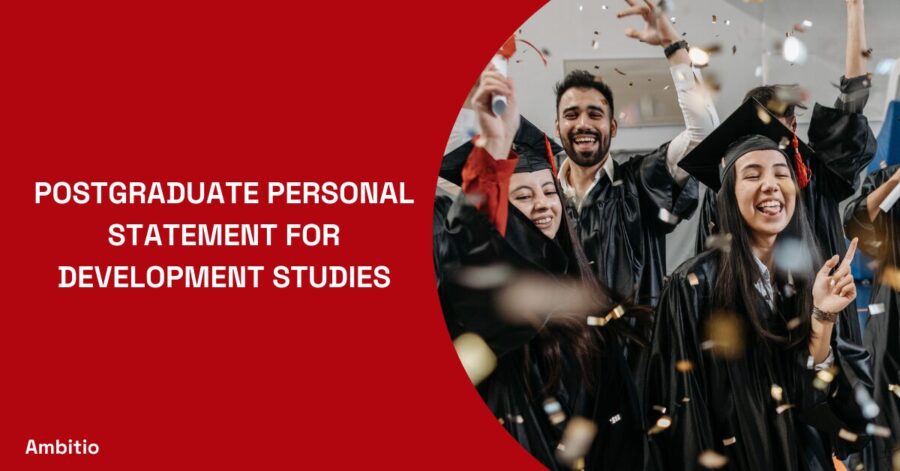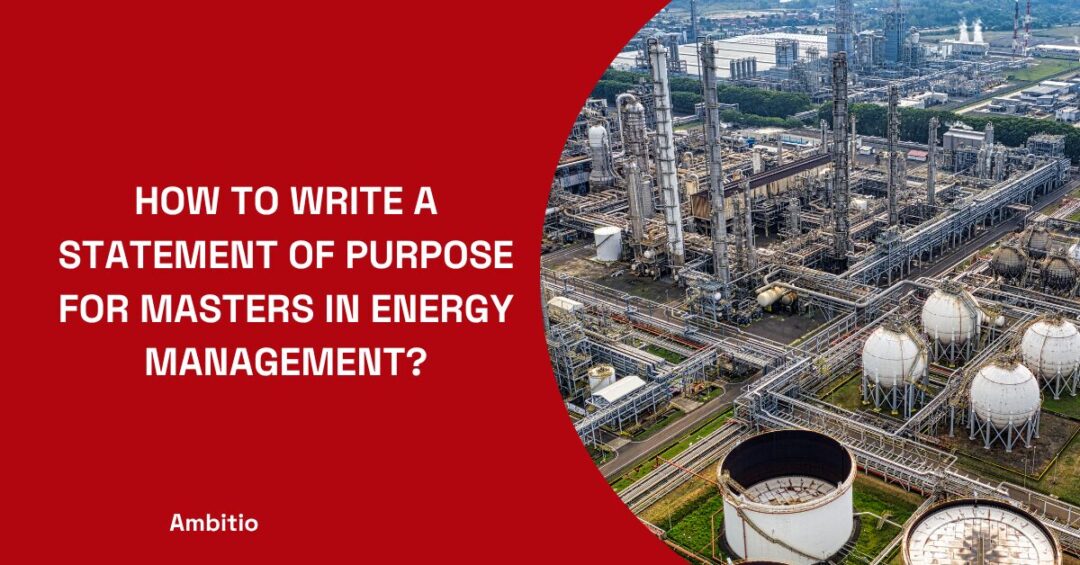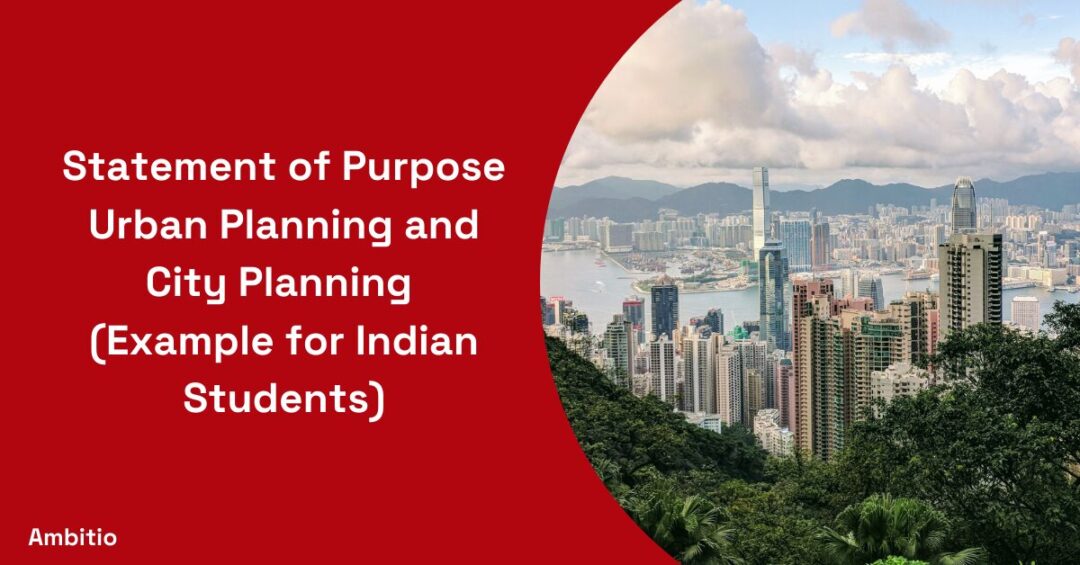14 December 2024
5 minutes read
Crafting a Standout Postgraduate Personal Statement for Development Studies

Navigating through the complex maze of postgraduate applications can be daunting. Yet, a well-crafted personal statement stands as a beacon that guides admission committees to your potential. In the transformative field of development studies, this document goes beyond mere formality; it reflects a commitment to international development and an aspiration to drive social change.
This comprehensive guide will equip you with the essentials of writing a compelling personal statement for your postgraduate development studies application.
Understanding the Essence of a Personal Statement in Development Studies
A personal statement is more than a narrative of your academic history; it’s a strategic document crafted to persuade. For development studies, a field that thrives on passion, innovation, and the desire to make a tangible difference, your statement is a testament to your suitability for the rigorous demands of postgraduate study.
The Anatomy of an Effective Personal Statement
An effective personal statement for development studies should begin with a clear and engaging introduction, setting the stage for your narrative. It must seamlessly weave together your past experiences, present endeavors, and future aspirations.
Start by reflecting on what drew you to the field of development studies. Was it an undergraduate course, a volunteer experience, or a personal encounter with socio-economic disparities? Use this reflection to establish a connection between your background and your chosen course of study.
As you move into the body of your statement, detail your academic achievements, internships, and work experiences that have prepared you for this advanced study.
Highlight specific projects or research that ignited your passion for topics like human rights, sustainable development, or global health. Your personal statement should not just recount experiences but also reflect on how they shaped your understanding of development issues and your capacity to address them.
In concluding your statement, focus on your future goals. Articulate a vision that aligns with the ethos of the program you’re applying to. Whether you aspire to work with international organizations, NGOs, or think tanks, make it clear how the postgraduate program will serve as a launchpad for your career in international development.
Bridging Academia and Real-World Challenges
In the development sector, theory and practice are inextricably linked. Use your personal statement to demonstrate how your academic background has provided a foundation for understanding development theory and how your professional or volunteer experiences have given you a glimpse into the practical challenges faced in the field.
Discuss academic courses that have expanded your knowledge base and analytical skills. Maybe you excelled in a module on world politics or you conducted a significant piece of research on socio-economic development. Connect these experiences to the specific aspects of the postgraduate program you are interested in, such as its focus on policy, economics, or social justice.
In terms of professional experiences, whether you interned at an NGO, volunteered in a developing country, or worked in a related field, outline your roles and responsibilities.
More importantly, discuss what you learned from these experiences and how they have equipped you with skills such as project management, cross-cultural communication, and strategic planning.
Articulating Your Motivation for Studying Development Studies
The Driving Force Behind Your Choice
Your motivation for pursuing a postgraduate degree in development studies is a critical component of your personal statement. This is not just about what you want to do but why you want to do it.
Articulate the core reasons behind your interest in development studies. Perhaps you’re driven by a commitment to addressing inequality, a fascination with development economics, or a desire to contribute to sustainable development initiatives.
Reflect on any pivotal moments that clarified your commitment to this field. These could include influential books, significant global events, or personal experiences. Explain how these moments have not only shaped your perspective but also how they’ve fueled your passion for the field of development studies.
Highlighting the Synergy Between Your Goals and the Program’s Offerings
Mapping Your Aspirations to the Program’s Strengths
It’s imperative that your personal statement aligns your career goals with the strengths of the program. Research the program thoroughly and identify particular features—be it certain courses, faculty members, research opportunities, or the program’s overall philosophy—that resonate with your academic interests and professional objectives.
Delve into how the program’s curriculum, its approach to development issues, and its network of alumni can help you fulfill your career aspirations. Whether you aim to influence policy, engage in ground-level program implementation, or pursue doctoral research, show how the program stands out as the ideal stepping stone in your academic and professional journey.
Reflecting on Your Personal Growth and Development
Self-Reflection as a Development Studies Candidate
In development studies, self-reflection is a powerful tool for personal and professional growth. In your personal statement, reflect on your journey—academically, professionally, and personally. Discuss how you have grown from your experiences and how they have prepared you for the challenges of postgraduate study.
Talk about any obstacles you’ve overcome, lessons learned, and how these experiences have shaped your worldview. This section is not just about showcasing resilience but also demonstrating self-awareness and the ability to critically analyze your own development.
Demonstrating Your Commitment to Global Development Issues
A Global Outlook on Development Challenges
In today’s interconnected world, a global outlook is indispensable, especially in development studies. Your personal statement should showcase your awareness of global development issues and your commitment to addressing them. Discuss any international experiences, language skills, and cross-cultural competencies that you bring to the table.
Elaborate on specific global challenges that you are passionate about, such as climate change, global health, education, or gender equality. Explain how the postgraduate program will help you to make a meaningful impact on these issues. Make sure to link your individual interests with global trends and show how your prospective studies will prepare you to make a difference on a larger scale.
Projecting Your Future in the Development Sector
Envisioning Your Role in Advancing Development
Finally, your personal statement should project your future in the development sector. Discuss the kind of roles you see yourself taking on post-graduation. Are you aiming to be a policy analyst, a field officer, an academic researcher, or a program manager? How will the skills and knowledge acquired during your postgraduate studies contribute to your effectiveness in these roles?
Outline how you plan to leverage the network, expertise, and credentials of the postgraduate program to advance your career. Whether it’s through engaging with policy, participating in international forums, or leading innovative projects, paint a picture of your future that is both inspiring and grounded in the realities of the development field.
In conclusion, your personal statement for a postgraduate degree in development studies is a narrative that encapsulates your academic prowess, professional experiences, and personal convictions.
It is a statement of purpose that should resonate with the vibrancy and urgency of global development challenges. By following this comprehensive guide, you can craft a document that not only shines a spotlight on your potential but also serves as a testament to your dedication to making a positive impact in the world.
FAQs
Q1: What should I include in my personal statement for development studies?
Include your educational background, work experience in the development sector, career aspirations, knowledge of the field, and specific interests related to the course and institution you’re applying to.
Q2: How long should my personal statement be?
Typically, a personal statement should be about one page long, but always check the specific requirements of the programme you’re applying to.
Q3: Can I use the same personal statement for different postgraduate applications?
While the core of your personal statement may remain the same, you should tailor it to reflect the unique aspects and requirements of each programme and institution.
Q4: How can I make my personal statement stand out?
Show genuine passion, be clear about your aspirations, and demonstrate how your past experiences have prepared you for a degree in development studies. Use headings, bullet points, and concise language to make key points stand out.
Q5: Do I need to have work experience in the development sector to apply for a postgraduate programme in development studies?
While related work experience can be beneficial and enhance your application, it is not always a mandatory requirement. However, showing a clear understanding of the field and how the course would help you achieve your career goals is essential.

You can study at top universities worldwide!
Get expert tips and tricks to get into top universities with a free expert session.
Book Your Free 30-Minute Session Now! Book a call now




























